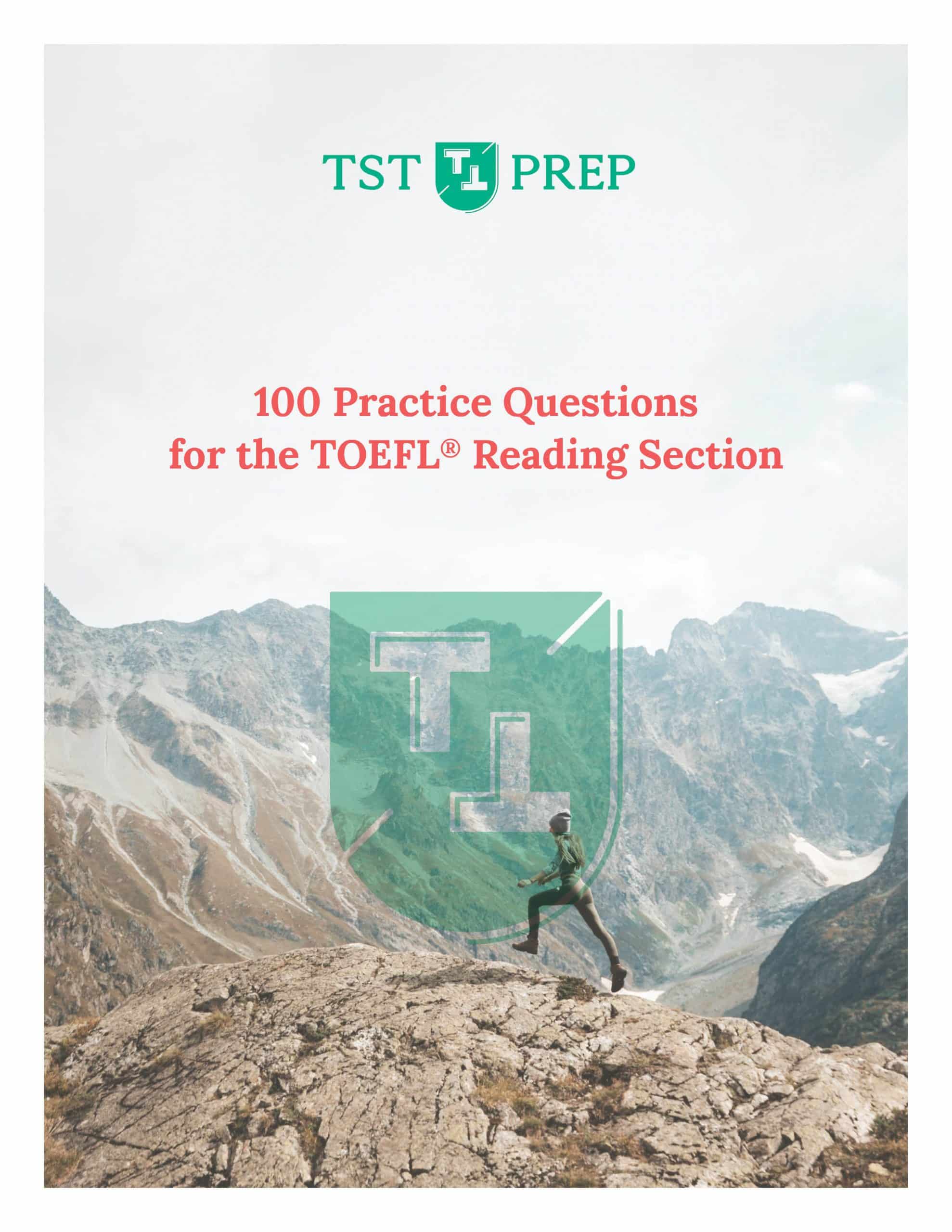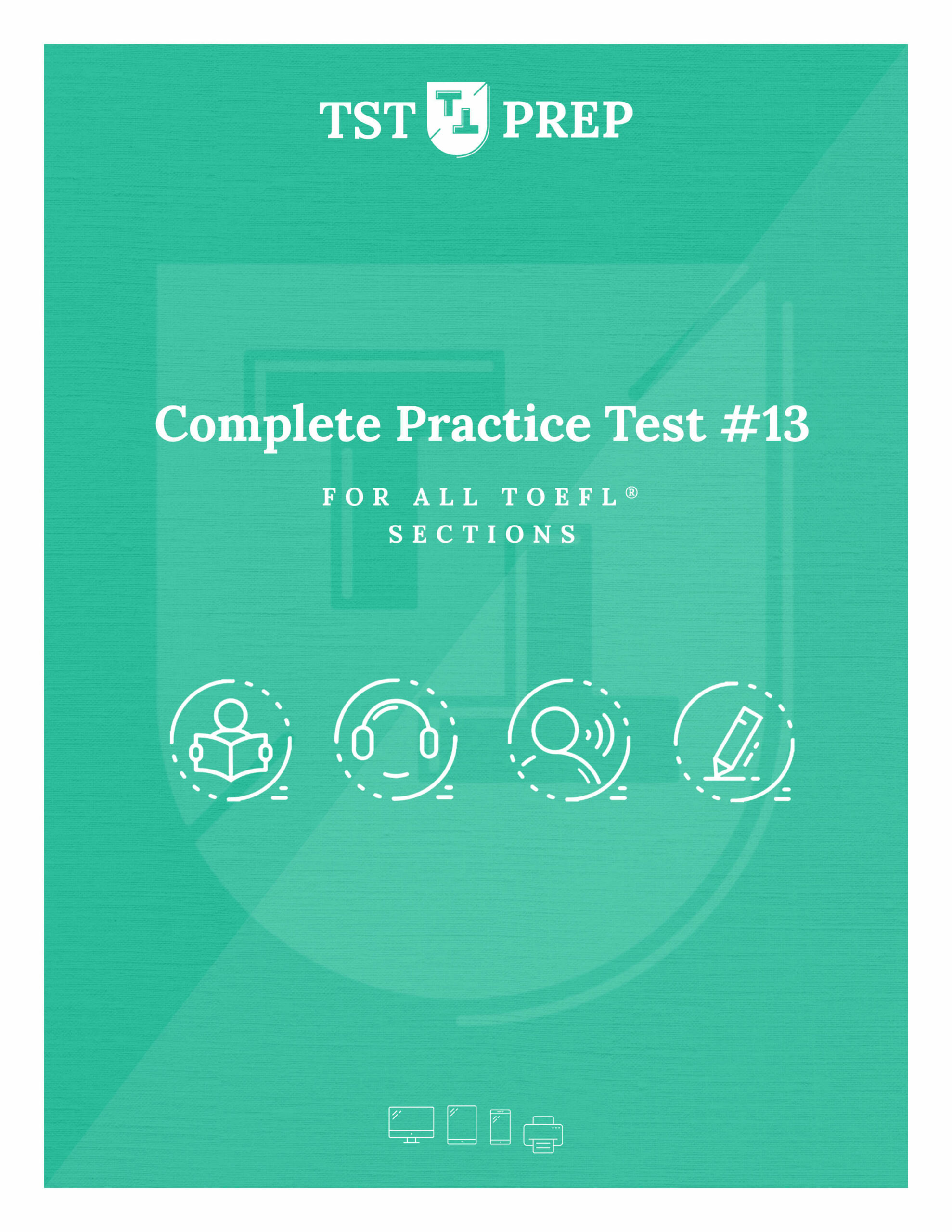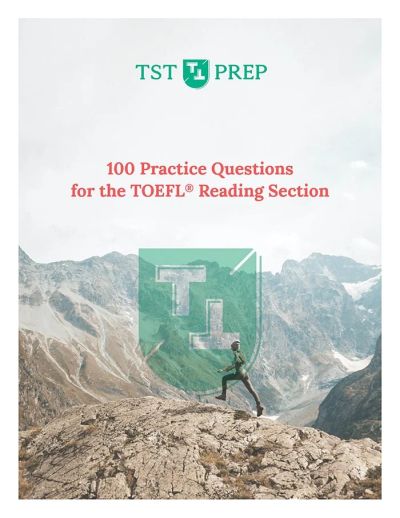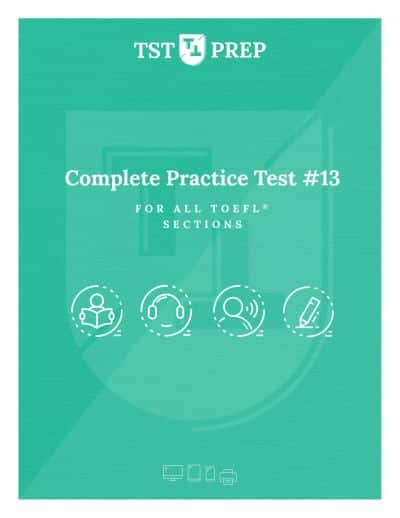Looking for some TOEFL Reading practice?
Look no further.
Below you will find 100 free to download TOEFL Reading practice questions, organized based on question type.
But first, how many reading questions are on the TOEFL?
Since August 2019, in the TOEFL Reading Section, you can expect 20 questions that you’ll need to answer in 36 minutes.
There are 10 different question types:
- Vocabulary Questions
- Rhetorical Purpose Questions
- Inference Questions
- Sentence Simplification Questions
- Insert Text Questions
- Factual Information Questions
- Negative Factual Information Questions
- Reference Questions
- Fill in a Table Questions
- Organization Questions
Get some TOEFL Reading Practice free online, right here on our site.
How do I practice reading for the TOEFL?
What you need to know about the TOEFL Reading
The TOEFL Reading exercises cover a number of academic topics with passage difficulty varying between an 8th grade level, which implies an appropriate text for a 14-year old American junior high school student, and a 14th grade level, which implies an appropriate text for a 20-year-old American college sophomore.
How many reading passages are on the TOEFL?
In the TOEFL iBT Reading section you have 36 minutes to:
- Read three academic texts, totaling around 2100 words
- Understand how to answer 10 different types of questions
- Answer 20 questions in total
And, unfortunately, the TOEFL Reading practice materials available online are either out-of-date or unreliable.
These are just a few of the reasons why we have designed our own TOEFL Reading Practice Questions with answers that you can access for free right here.
Here’s just one example:
Human Anatomy
Human anatomy is the scientific study of the body’s structures. Some of these structures are very small and can only be observed and analyzed with the assistance of a microscope.Other larger structures can readily be seen, manipulated, measured, and weighed. The word “anatomy” comes from a Greek root that means “to cut apart.” Human anatomy was first studied by observing the exterior of the body and observing the wounds of soldiers and other injuries. Later, physicians were allowed to dissect bodies of the dead to augment their knowledge. When a body is dissected, its structures are cut apart in order to observe their physical attributes and their relationships to one another. Dissection is still used in medical schools, anatomy courses, and in pathology labs.
Flesch-Kincaid Grade Level: 8.5
1. The word augment is closest in meaning to
A. Prove
B. Increase
C. Validate
D. Spread
1. B (vocabulary)
B is correct because increase is closest in meaning to augment. Spread is similar in that it means to make something larger, but spread implies that something grows outward, while augment, in this situation, implies an increase.
But wait…
Do you notice something strange about this TOEFL Reading exercise?
It’s short! Usually, a TOEFL iBT Reading passage is 700 words, but this is just 100 words.
And there’s only one question after the passage (usually there are 10).
This unique approach to practicing the TOEFL Reading section is designed to help you improve your reading skills and speed. But if you want to know how to use these TOEFL Reading practice questions with answers to improve your reading score, here are five easy steps to follow.
The latest update for the TOEFL iBT test came on July 26, 2023. You can expect 20 questions that you will need to answer in 36 minutes. 10 TOEFL Reading questions per passage. You will have 18 minutes to complete each passage. You have 36 minutes to complete the TOEFL Reading section. You will read two academics, totaling around 1400 words.
TOEFL Reading Practice Step 1: Practice with short passages
If you’re like most students, then you want to practice in a way that looks exactly like the test. You want to read a 700-word passage and answer 14 TOEFL reading questions in less than 20 minutes.
Practicing for the test and replicating the conditions will help you prepare for the format of the TOEFL, but it will not help you increase your reading comprehension or English fluency.
Improvement comes when you reflect on your answers and identify why you did something wrong.
Practice alone is not enough to help you improve, you must also reflect.
When you do a single reading passage and answer 14 questions about it, you are reflecting on the entire experience, a 20-minute reading exercise, instead of a single question. When you use these short reading passages, you get more immediate feedback on your responses. This, in turn, will help you quickly identify the question types and TOEFL reading topics you struggle with.
Besides providing you with more specific and immediate feedback, here are a few more benefits of using short passages to practice:
- More exposure to various topics
- Study in short intervals of less than five minutes
- Learn more vocabulary in less time
- Build your reading skills
- Master question and answer strategy
Once you dive in and start to answer the questions you will find these short passages to be the exact answer you have been looking for to help you improve your TOEFL Reading skills.
TOEFL Reading Practice Step 2: Don’t forget to review the structure
These short TOEFL Reading samples are just like the TOEFL, only shorter. It’s still important for you, however, to get a clear understanding of exactly what to expect from the TOEFL Reading section on test day.
- Here are some of the most important points:
- Read three academic passages of 700 words
- Take 18 minutes per passage, 36 minutes in total
Answer 10 questions per passage
There is no way to predict what kind of passages you will receive in your TOEFL test, but here are some of the more popular TOEFL reading topics:
- Biology
- History
- Geology
- Psychology
- Environmental Science
- Ecology
- Astronomy
- Education
- Art
- Archaeology
Learn exactly what to expect on test day. Download your complete TOEFL test
Now, you might be confused by all of the question types in the TOEFL Reading practice test PDF…
…and you’re not alone!
There are ten reading question types and some have strange names like rhetorical purpose and pronoun referent questions.
But don’t worry.
In the chart below, all of the question types have been laid out and separated based on frequency, common lexical structure, and the time it should take you to answer each.
The Reading Section Question Types |
||||
|---|---|---|---|---|
| Question Type | Frequency | Time to Answer | Question Value | Question Phrasing |
| 1. Vocabulary | 2-4 | 60 seconds | 1 | “The word _________ in paragraph 2 is closest in meaning to…" |
| 2. Factual Information (Detail) | 3-6 | 90 seconds | 1 | “According to paragraph 4, what….”
“Which of the following…” “It is stated in paragraph 4 that…” |
| 3. Negative Factual Information (Negative Detail) | 2-4 | 120 seconds | 1 | “All of the following are mentioned in paragraph 3 EXCEPT…” “Which of the following is NOT mentioned....” |
| 4. Inference | 2-4 | 90 seconds | 1 | “What can be inferred from paragraph 5 about…” “Paragraph 5 implies that…” “Paragraph 5 suggests…” |
| 5. Rhetorical Purpose (Author’s Purpose) | 2-4 | 90 seconds | 1 | “In paragraph 6, the author discusses ________ in order to…” “Why does the author mention…” |
| 6. Sentence Simplification (Paraphrasing) | 2-3 | 120 seconds | 1 | “Which of the sentences below best expresses the essential information in the highlighted sentence in paragraph 4?” |
| 7. Insert Text (Sentence Insertion) | 2-3 | 120 seconds | 1 | “In paragraph 2 there is a missing sentence. Where would the sentence best fit?” |
| 8. Reference (Pronoun Referent) | 0-1 | 60 seconds | 1 | “The word _________ in paragraph 1 refers to…” |
| 9. Prose Summary (Summary) | 1-2 | 150 seconds | 1 | “An introductory sentence for a brief summary of the passage is provided below. Complete the summary by selecting the THREE answer choices that express the most important ideas in the passage." |
| 10. Fill In A Table (Organization) | 0-1 | 150 seconds | 2-3 | “Complete the table below to summarize information about _________ in the passage. Match the appropriate statements to _________” |
TOEFL Reading Practice Step 3: Practice with a timer

If you have done some TOEFL Reading practice tests already, then you know that time management is an issue for the reading section. Few people can read the entire passage and answer all of the questions in a given passage in less than 18 minutes.
It takes skill to read a question, understand the meaning, identify the key words, and find that information in the passage in less than two minutes. Even if you understand the question and know where to look, it may still be challenging to identify which information is essential to help you answer the question.
When you work through these short passages, you can answer based on question type. Each passage will be followed by a single and predictable question.
But I can’t emphasize this enough…
…be sure to challenge yourself by setting a timer. And keep in mind that some TOEFL questions take longer than others.
For example, in the case of vocabulary questions, give yourself only 60 seconds to answer. However, if you are working on detail questions, set the timer for 90 seconds. (refer to the chart above for each question type’s timing)
Human Anatomy
Human anatomy is the scientific study of the body’s structures. Some of these structures are very small and can only be observed and analyzed with the assistance of a microscope. Other larger structures can readily be seen, manipulated, measured, and weighed. The word “anatomy” comes from a Greek root that means “to cut apart.” Human anatomy was first studied by observing the exterior of the body and observing the wounds of soldiers and other injuries. Later, physicians were allowed to dissect bodies of the dead to augment their knowledge. When a body is dissected, its structures are cut apart in order to observe their physical attributes and their relationships to one another. Dissection is still used in medical schools, anatomy courses, and in pathology labs.
Flesch-Kincaid Grade Level: 8.5
2. Which of the following is true about human anatomy?
- The word “anatomy” is derived from a French root that means “cut”
- The observation of soldiers’ wounds were originally used to study human anatomy
- Human and animal bodies were dissected in labs to understand human anatomy
- The smaller structures of the human body need to be observed with a telescope
2. B (detail)
B is correct because the other 3 options are all untrue – they each contain at least a word that changes its original meaning. The passage states “Human anatomy was first studied by observing the exterior of the body and observing the wounds of soldiers…”. While the words “human anatomy” are mentioned a few times, the answer can be found by searching for other keywords like “soldiers’” and “wounds”.
This TOEFL reading practice example is challenging, but, over time, you will get used to the time restrictions and it will get easier. You will start to improve the speed and accuracy of your answers, which will improve your performance on complete TOEFL iBT Reading practice passages.
Lean more about the how to manage your time better for the Reading section of the TOEFL test.
TOEFL Reading Practice Step 4: Review your answers
Think of your favorite professional athlete.
Now imagine the incredible amount of work they endured to become one of the best at their sport.
Of course they practiced, but, more importantly, they watched the game film.
After the game, most professional athletes sit in a room and watch their performance. In American football, players spend dozens of hours every week watching their games because they understand that improvement comes through the study of what went wrong in the past.
Improvement comes through the study of past performance.
Your TOEFL test is a performance of your English ability. Use the information you get from practicing your reading comprehension skills to understand your personal strengths and weaknesses. After you know what your problem is – for example, you have trouble answering inference questions – map out a course of action that will help you improve.
Most students only practice. Sure, everyone checks their answers, but only for a score, not to gain a deeper understanding of why they were wrong and how they can improve in the future.

Here are some questions to ask yourself after you have answered a question wrong:
- Did I misread the passage or the question?
- Was there difficult vocabulary that I didn’t understand? Is this word part of the Academic Word List?
- Is there a particular question type I struggle to answer? What’s the answer and how do I fix it?
- What can I do to ensure I don’t make the same mistake again?
In the ELT world (English Language Teaching), this is referred to as reflective practice. It’s popular in many other fields, like medicine and management, but it has also become an important component of improving teacher performance.
Failing to review your answers is just one of many mistakes students make when preparing for the reading section of the TOEFL. You can check out the five most common TOEFL Reading mistakes and how to avoid them below.
TOEFL Reading Practice Step 5: Improve your vocabulary
Now at this point you:
- Understand why these short reading passages are so helpful
- Reviewed the overall structure of the TOEFL Reading section
- Know how important it is to set a timer and develop your time management skills
- Are ready to not only practice the questions, but review the answers
It’s now time to work on the most critical component of your TOEFL Reading score: your vocabulary.
How can I improve my reading comprehension for the TOEFL?
Simply put, if you don’t understand the words, you can’t understand the passage.
If you are not getting the score you want in the reading section, then you must invest the necessary time and energy into studying vocabulary. Now, there are thousands of words in the English language, so it’s hard to know which are important.
There are a lot of vocabulary lists, but this is the only one you need for the TOEFL Reading, download The Ultimate Vocabulary List for the TOEFL – free PDF
Originally developed in 2001 by Averil Coxhead, a distinguished linguist and researcher, she found that there were certain words that consistently show up throughout academic texts, regardless of the topic.
Unlike other TOEFL vocabulary lists, this one has been academically researched and verified by working professionals in the English Language Teaching Community.
If you know these 570 words, it will have a dramatic impact on your TOEFL Reading score.
Read more about our ultimate vocabulary list for the TOEFL test.
Conclusion
So, how can you improve your reading skills for the TOEFL?
- Practice with short passages
- Review the structure
- Use a timer
- Review your answers
- Improve your vocabulary












103 Comments
Farida
Thank you for the opportunity to practice before the test day! It’s really helpful!
Josh
Thanks for the comment Farida! Let me know if there’s any other way we can help.
Dora Seyram Doe
I got myself glean to your texts as though it was the exams i was taking. I like your honesty on letting your readers know that, “TOEFL is a difficult one but with constant practice, one can be ready to take the exams with no fear”
Reading and listening with you is never boring, well, to me . You make understanding what information you want to send across way easy to grasp. Nice.
I hope to practice more as advised in other to take my exams in June.
Josh
Dora thanks for leaving such a nice comment! I know the TOEFL can be pretty dry, so I try to make the material as engaging as possible for students. And you are right, hard work over time leads to improvement. Thanks again for your support 🙂
Alla
Hello Josh) Thank you for your great work! Can I ask you to resubscribe my email? I am retaking the TOEFL in a month and want to practice with your materials. Thank you)
Josh
Hi Alla! Sure thing. I’ll add you now. Thanks for your trust! Let me know if there is any other way I can help.
Joyce Ihenetu
This is awesome. I have never found such an elaborated free online practice. It is very unique. Thanks very much for such generosity to help us
Josh
Thank you Joyce for your kind words!
And please, spread the word 🙂
We are a new site and can use some attention.
Let me know if there is any other way we can help.
Mohammed Kasha
You are such an amazing teacher. Thanks you in advanced for your advice. I have a problem in writing, Can you help me?
Josh
Hi Mohammed and thank you for your kind words. We have a couple of articles about the TOEFL Writing, like this one – https://tstprep.com/ten-awesome-toefl-writing-tips/
And we also have classes for the TOEFL Writing, one is actually starting next week – https://tstprep.com/toefl-store/toefl-writing-group-classes/
If you have any questions about the classes you can send an email to contact@tstprep.com
Hope that helps!
Fethi
I ve just discovered your page and got a few files and looking forward to using it with my sts. Hope we ll enjoy and get more tactics.
Thanks Josh.
Josh
Thanks for taking the time to comment Fethi. Hope you find this information helpful!
Daniel Madit
Hi Mr Josh, I am a student who have done tofel exams twice but failed to reach the university required criteria and mostly i do fail reading and listening sections. Can you please advise me the best way to study and get prepared for another test and hopefully i pass?
Please help me also with the best practising materials as of the above,
I will really appreciate your help.
Many thanks and wait to hearing from you.
Daniel,
Josh
Hi Daniel;
Well, the best thing for you to do at this point is to meet with a teacher because clearly, you need some additional help in understanding your strengths, weaknesses and what you need to do to improve. And not only that, you need someone to structure your studies in a way that you can improve over time Here’s a link for you to learn more – https://tstprep.com/toefl-store/toefl-private-lessons/
Besides that, I wrote two articles for EFL Magazine on this issue that you can read:
How to Improve Your TOEFL Reading Scores – https://www.eflmagazine.com/how-to-improve-toefl-reading-scores/
How to Improve Your TOEFL Listening Scores – https://www.eflmagazine.com/how-to-improve-toefl-listening-scores/
Hope that helps.
Becko
You are a great teacher. What you have done is so helpful to a lot of students, therefore, I thank you.
Josh
Thank you so much for your kind words Becko. It means A LOT 🙂
Zuhal
Thanks a lot I have find your tips very useful.
Josh
That’s great news Zuhal! Please spread the word 🙂
Aravind
congratulation …… Your sense of humor and you spontaneity makes you unique.
Josh
Ha, thanks for the compliment. Much appreciated 🙂
Lil
Hi Josh, this is extremely helpful, thanks a lot. I especially like the fact that it is free…lol. I must say that could be a big barrier for those of us who are unable to afford more than the test’s fee. This will be a big help for a lot of students around the world but a lot of students still don’t know about it, perhaps something should be done about that. Cheers!
Josh
Hi Lil and thank you for leaving such a nice comment. Of course, I would love to spread the word around more about our site. If you have any ideas, please let me know 🙂
Iram
please let me know how to identify key words in detail and inference questions?
Josh
Hi Iram;
Here’s a link to an old document I give to private students about detail questions. On page 6 I believe is a section about key words.
https://drive.google.com/open?id=1ZHtZMt-IhpHRnE1UzbOV7F-13ZI0vloh
I hope you find it helpful.
Abu Noor
Hi Mr. Josh
I took the test before and I scored 88. I need to get 100 to be admitted to my favorite school. Mostly, I struggle in the reading section. I scored 19 which is low for 100. I found your reading passages are very helpful and promoting. What other advice can you give me to improve my score?
Thanks a lot
Josh
Hi there and sorry I didn’t respond sooner. For some reason, I missed this comment. A few months back I wrote an article for EFL Magazine, “How to Improve Your TOEFL Reading Score” – you may find it helpful – https://www.eflmagazine.com/how-to-improve-toefl-reading-scores/
Selin
Thank you for all the helpful information and tactics Josh. I’ve been watching your videos and taking notes from it. I used to find studying and preparing for TOEFL very boring and but thanks to your entertaining and useful way of teaching I’m not that scared of it anymore 🙂 Thanks a lot!
Josh
Wow, what a compliment Selin and thank you so much for your kind words. It really makes this whole effort worth it. I really do appreciate it 🙂
Kiana Khosravani
Hi, dear Josh; thanks for these helpful and useful tips and courses for the TOEFL. I wonder if you can give some tips for categorizing table questions in the reading part which I am weak at solving them.
Josh
Hi Kiana, here is a link to an old document I made about organization questions(table questions). https://drive.google.com/file/u/1/d/1qQQfZQjjKNIFFHPBzzS7B0sx-z3whIZ3/view
Be aware that they are rare and you probably won’t see one on the test.
Sid
Josh the reading section was far more difficult than your examples
Josh
SID thank you for the feedback. Here is a link to a ten-page document which outlines the steps we took to ensure that the tests are similar to the ones released to the public by ETS – https://docs.google.com/document/d/1dXKct5ziVIkbX01sWqKEaSDPCI5NTfuvCeoaCQ0hWvE/edit?usp=sharing
Pragya
Thank you so much Josh. I found your videos and tips very useful and hope to get good scores at my toefl. You are an amazing and generous teacher. Your videos made toefl preparation more interesting with your perfect sense of humour.
Josh
Pragya thank you so much for your kind words, they really motivate me to keep pushing forward. Good luck on the exam and let me know if there are any topics we should address in the future.
Tom
Thanks so much, Josh. I got a question here, do you recommend me looking at the choices of the question before going into the reading?
Josh
Hi Tom and great question. I do, but I usually recommend just looking at just one or two of the options. In my experience, if I look at all four options, I tend to forget them and get confused when I am reading the passage. I hope that answers your question.
Naseer Ahmed
Thank you so much dear sir for your help and support.
I have one question I hope I’ll get a better response.
The question is that I can’t use newly learned words in speaking and writing.
Josh
Hi Ahmed, this is a good question and hard to answer. You will have to experiment, writing sentences and responding to questions with the specific aim of experimenting with new vocabulary. I would strongly recommend working with a teacher or knowledgable friend who can give you feedback on whether you used the new vocabulary correctly or not. Feedback is always best.
Dhivyalakshmi
Hey Josh! Do you have any extra tips for summary type questions? That is the only type of question i am having trouble right now!!!
Josh
Great question. This is probably the hardest question types for most TOEFL students which is why there’s an article about it here – https://tstprep.com/how-to-answer-toefl-summary-questions-a-step-by-step-guide/ – I hope you find it helpful!
Lina Assaf
all the advises are very beneficial. Also, the practices, articles, and videos are great.
Thank you Josh
Josh
Thank you for your kind words Lina! I’m happy to hear they have helped.
Gokhan
Hı Josh,
I decided to take Toefl. However ,I haven’t never practiced before in any reading section.
When I practiced mock-reading test I did 23 of 42 without any knowing your tricks and tips.
Do you think can I accomplish?
Gökhan
By the way I need just 86 point =)
Josh
Got it. I just responded to your other comment.
Josh
Hi Gokhan. It’s hard to say. It depends on more than just a single test score. We tend to work closely with students 1-1, get to know their strengths and weaknesses, and take multiple mock tests and practice questions before providing a score estimate.
With that score, you would get between 1 16-18 in the TOEFL Reading. If you practice and study for a month, you could increase your score in a given section by up to 4 points, which would give you about a 20 in the Reading.
Again, this is impossible to predict accurately since I don’t know your capabilities, but it’s a rough estimate based on previous experience.
Francisco
Hello
I’m going to do my toefl test this Friday, and I need 100 points (at least). The last time (3 months ago) I get 77, but since then I have been practicing.
I think I don’t have too much problem with speaking and writing, but I need to get the best score possible on reading and listening. What do you recommend to me?
Josh
Hi Francisco. If you asked a few months ago I would have recommended some of our free practice and this article https://www.eflmagazine.com/how-to-improve-toefl-reading-scores/ – it takes time, but it sounds like you have been practicing so hopefully that is enough. You may also find this video on how to improve your vocabulary helpful as well – https://youtu.be/Xs2rNoZHFAI
Mahaindo
Thanks for finally talking about >TOEFL Reading Practice:
PDF Test + 100 Free Questions – TST Prep <Loved it!
Josh
Sure thing! I’m happy to hear you found it helpful.
Abdul
Hi, thanks a lot Josh, amazing videos on the youtube channel, anyway I have two questions I hope ill get resolved,
1)Can I use abbreviations in my writing? etc: didn’t , I’ll…
2)When responding to a speaking answer, If I finish my response early, can I quickly summarize my points, or will that just make my response sound redundant and weak?
Thank you again!
TBH, it’s kinda hard to believe nice people like you still exists on the internet…
Josh
Hi there and great questions. First of all, yes you can use contractions like “don’t” or “isn’t” but avoid text language like “LOL” and “BRB”. In response to your second question, you do not want to have much silence, so if you have some extra time it’s better to sound redundant than to remain silent. I hope that helps!
Morsal Hamidi
I am struggling so much with reading section, although I am using a lot of good strategies, but still my score is about 19 to 20, and my target is 28+, so I do not know what should I do.
Josh
Hi Morsal and sorry to hear about your struggle. We have private teachers and even TOEFL Reading group lessons starting in a few weeks. However, if you don’t want to work with a teacher, then I suggest reading A LOT. Go to the site LingQ, they have a lot of practice materials for language learners and tools to help you remember vocabulary and build your skills.
I hope that helps!
Zahabiya
Hi, I have been referring to your videos and tips for toefl preparation. In reading section I am struggling with the summary\organization questions. Do you have any tips on how to approach those questions? I take TOefl in 5 days.
Thank You for all the awesome videos and tips.
Josh
Hi Zahabiya and good question. I often get asked about summary questions. We actually have an article about TOEFL Reading Summary questions which pretty much includes all of the tips I have for that question. You might find it helpful. https://tstprep.com/how-to-answer-toefl-summary-questions-a-step-by-step-guide/
Sakshi
Hi, I’m struggling with my reading score. First I got 14, then I got 18. I really want to get a score above 28 in reading. Can you please, give me tips? And I have only a few days to prepare.
Josh
Hi Sakshi and thank you for your question. Just to let you know, it is not possible to improve a score by 10 points in just a few days. It will take some time. However, you are on the right path, continue to practice with TOEFL materials and read a lot of interesting and enjoyable material in your free time. Good luck on your test and if you are still struggling, you might want to talk with a teacher during a trial lesson at this link – https://tstprep.com/toefl-store/toefl-trial-lesson/
Laura
Thanks a lot!! I was studying with the emergency course, some of your videos on youtube and this free material. And i improved my score in the reading by 7 points!! from 18 to 25. And got 103! So glad and greatful for this courses and videos.!
Josh
That’s great, Laura and congratulations!
Waleed
Hello,
I wonder if I can get the pdf form of your lecture notes and the pdf form of practice questions.?
Josh
Hi Waleed. In our courses, we do include links to the Google Slides that are in the lectures, but the rest of the materials are just on our interactive platform. Sorry about that.
Mobin
Dear Josh
I would like to express my gratitude for your hard work and generosity. What you do means a lot to less fortunate teachers living in economically weak countries. I am going to use your sample exercises in my classes and I hope it is fine with you. The least I can do is to encourage students and teachers to visit your useful website to promote your visibility.
What you are doing is high-quality work and is even difficult for native speakers, and the fact that you share them freely shows how great you are.
Cheers
Josh
Wow, Mobin thank you for your kind and generous comment. I’m happy to hear you have found these materials useful. If you ever need additional resources for your students, just let me know. You can email me directly at josh@tstprep.com – I’m always happy to help a fellow teacher.
Mehmet
Josh, you are an amazing guy, these are helping a lot!
Josh
Thank you. I’m so happy you found them helpful!
Bakyt
Good evening Josh. I have questions to ask you. My TOEFL Test is scheduled for December 2021. Last spring I used to take the genuine TOEFL Test that was more challenging than the trial test. The most difficult sections in TOEFL Test were Reading and Listening. I was incapable of completing these questions since I ran out of time. What is the best way to work on these sections? Could you provide me with some useful tips on improving my reading and listening skills and how to manage my time while taking the test? I’ll await your reply!!!!
Josh
Hi there and thank you for your question. Well, I have a few videos on the Youtube channel about this very question, I’ll put a link below and then you can look through the channel for similar videos. If those don’t help, then you might want to consider working with one of our TOEFL teachers here – https://tstprep.com/store/toefl-trial-lesson/
https://youtu.be/dBIix5rR4Nc
Krishaben Shah
I am very poor in Reading; please help me get 22 in Reading.
Josh
If you have watched some of my free videos and tried the practice questions already, you might want to talk with a teacher to ask for some guidance. You can take a trial lesson here – https://tstprep.com/store/toefl-trial-lesson/
Salma
I am struggling with my speaking (first question), my target is +26, and I am having issues with taking and having an example.
Josh
Hi there Salma. It’s hard for me to answer since every student is different, but here is a link to a document called “coming up with reasons and examples”, which might help you find ways to expand your answer to question #1. I hope it helps. https://drive.google.com/file/d/1NpEhd9BLNVKOuOO08LpJ6lA2NSLOZgJO/view?usp=sharing
Junot
Hello Josh, I am very grateful for your helpful videos and PDFs. I have found them very helpful already though I have just familiarized myself with them for a few days. I have 2 months to prepare for my TOEFL Test and I have been preparing for a week now. I have also found myself already overwhelmed by the reading section. I found this section very tough. I also try hard every day to master the tips from your materials.
So, my question is: do you think that practicing every day within 2 months will help me to get 20 points for all sections? Your responses in this matter are valuable.
Thank you for your kind and amazing help.
Josh
Hi there Junot, good question, and unfortunately, it is hard for me to answer since I don’t know your current level. I would take a practice test on our site or on Youtube and see what your score is there. In general, I believe students can improve their score with two months of intense TOEFL practice between 5-18 points overall, with most around the 10-point mark. If you are far below your desired score in a given section (5 points or more) then you need both TOEFL practice and to improve your overall English comprehension, which takes more time. I hope that answers your question.
Pratyush
Hi Josh,
I am struggling with my reading score. I scored 22 in my past TOEFL exam. I have an admission from UMD college park, and they have enrolled me in the English bridge program because they need a minimum of 26 in reading. I have practiced a lot for reading, and in practice, I was able to score 25 to 26, but I don’t know what happens whenever I actually take the TOEFL exam at the test center. I have to submit a new TOEFL score before the 6th of July, so would be giving an exam on the 25th of June. Really need help with this.
Thanks & regards
Pratyush
Josh
Hi there, and sorry for my slow response, it looks like you might get this response too late, but I made a video here (https://youtu.be/osGQ6axyI7I) about how to practice and improve your score at home. This is the process I usually recommend for students in your situation. Sorry again, and hope everything works out!
Basit Saem
Hey Josh! Hope you are doing well
I’ve got a question if you don’t mind answering.
I have approximately 120 days to prepare for the actual test (2024/4/6). Well, my question is, how can I improve my reading skills along with my comprehension skills in this span of time?
I’d be thankful if you answer my question 🙏
My goal: 100-110
Josh
Hi Bassit and thanks for your question. The best way to improve is to practice. The best way to do that is to take some practice tests and see which question types are more difficult for you. Then research different strategies by question type. Also, consider taking our group reading classes, as we think they are very helpful.
Bhargav
Hello Josh, I appeared for my TOEFL exam a few days back, and I scored pretty great marks in almost all sections except reading where I only got 14/30. I have to reappear for the exam again in 20 days. The problem I was facing while going through the section was that I was unable to find proper answers as the font and word spacing were pretty unnatural and very uncomfortable to the eyes. Can you tell me some source in which I can practice with the same font style?
Before my test, I was also doing great in all sections, including reading. Kindly help me out.
Josh
Hi there and thank you for your question. Interesting problem. Well, I am going to link out to a free practice test from ETS, which might be a similar font. If that doesn’t work, you might want to copy and paste some text into Google Docs and Microsoft word, play around with the text, and try to make it the size and font you saw on test day. https://www.ets.org/s/toefl/free-practice/start.html
Meihui
Very useful material
Parvina
Hello Josh
Thank you so much for giving so many tips for getting high scores in every section.
Here, I’ve been teaching in a private school for three years and really want to take a test; however, inside, my anxiety is saying that I can’t. I really don’t know what to do. I’ve started many times to learn essential words for taking it, but after a week, I’m overwhelmed.
Could you please advise me on which part I should start?
Thanks in advance
Parvina
Josh
Hi Parvina,
I completely understand. The test can be very stressful. Where you should start depends on which areas are the most difficult for you. It is different for everyone. Perhaps consider coming in for a 30-minute evaluation so a teacher can help you make a more detailed plan.
Hedieh
Dear Josh,
This is Hedieh. Thank you for all the great tips and information. I will take the exam in late August. I wanted to ask about the time management for the new exam. I don’t think the 18 min per 10 questions would be fitting into the new reading exam time, and all I practiced so far is adaptable to the current exam system. I always have time management problems regarding dyslexia. I need more time to comprehend the texts I read or the words I choose to speak. Of course, this has never been an obstacle to stop me, however, it causes the anxiety that I will not finish in time. The same happens whenever I practice speaking, I get too excited to order my words without many fillers. I am concerned about this problem, that it would affect the results of my exam.
I hope that I could hear about your recommendations in this matter.
Thank you in advance
Josh
Hi Hedieh, Thank you for your question. ETS offers accommodations for students dealing with dyslexia. It takes time to arrange and it usually involves getting medical records from your doctor but it can be done! The first step is for you to contact ETS and find out what documentation they require. Hope this helps!
Wahida
Hello Josh, thank you so much for your support.
That is awfully helpful advice, but I have a question. It’s my first time teaching TOEFL classes. I learned about the test structure and what the student needs to understand, but I would like to ask what to do in my first class. Shall I teach them Vocabulary, Grammar? or what exactly?
Thanks a lot
Josh
Hi Wahida, I’m sorry it took me so long to respond to your inquiry. It’s hard for me to give set advice since a lot depends on the age of the students, the size of the class, and their current English level. I believe the speaking section is a good place to start since it is a bit simpler to explain than the other sections. I am going to provide a link to an out-of-print TOEFL teaching activities book from Peasron-Longman Publishers (https://drive.google.com/file/d/0BwyrGFd4jdd_UkZLaXY4N3B5c2s/view?resourcekey=0-Zk0Az2ELegKMHgOwz3LTLA). I used many of the activities when I was teaching, and I believe you will find a few helpful pieces of information in it. I hope it inspires you.
Good luck with the class!
Lisa
Hi Josh,
I was wondering if the answer for the text “Prosopagnosia” page 62 in the 100 TOEFL reading practice was right?
Thanks a lot.
Josh
Hi Lisa, Thank you for your question. We provide multiple reading practices. I am not sure which one you are referring to. Would you mind replying to this message by pasting in the full text of the question and the answer choices so I can help you?
Atiwullah
Hey Josh, Greetings from Afghanistan!
I wonder If you could share some speaking and writing templates with me. It’ll be your kindest help, and I’d really appreciate that.
Thanks in Advance
Atiwullah
Josh
Greetings to you too! 🙂 Templates can vary quite a bit and in general, we suggest using your own template that has words you feel comfortable with. I am linking some articles with tips about the speaking and writing sections. I think they will be useful in helping you develop templates that are the perfect fit for you.
https://tstprep.com/articles/toefl/ten-awesome-tips-for-the-speaking-section-of-the-toefl/
https://tstprep.com/articles/toefl/questions-topics-and-sample-answers-for-the-speaking-section-of-the-toefl-test/
https://tstprep.com/articles/toefl/sample-essays-for-the-writing-section-of-the-toefl-test/
Pelin
Hi, Josh. I have a question. On the actual TOEFL test in the reading section, will we be able to see the passage all the time? Or we read it once, the passage disappears and the questions appear?
Josh
Excellent question! The reading for each passage will be available for all 10 questions of that topic and will disappear when you move to the next passage (next 10 questions).
Smiley
Hi Josh, the questions that we’re practicing here, is there a chance that we’d get the same questions in the actual exam?
Josh
Hi Smiley, Yes, that sometimes happens when speaking task one. 🙂 Most likely, it will be a new question, though.
Yaki
Excellent questions
Shawkat
Thanks to the materials. Josh!
If you tell us what is the best template for a 26 score look like, that would be great.
Josh
Hi Shawkat, here is a link to our TOEFL Speaking 26+ Guide with templates that you might find useful. https://drive.google.com/file/d/1SJLKY3cXT9KfrhMT0d7zlD86By-VR0EB/view Keep in mind that templates will help you organize your responses and save you time, but they are not the sole thing that helps you get a high score. You will need to showcase your speaking skills and ideas in order to score well.
Hezbullah
Hello, Josh. I trust you are doing well. I am stuck in 21-23 in the reading and listening sections. How can I cross 25 in these two sections?
Josh
Thank you for commenting. You can find useful tips for all section on our site here – https://tstprep.com/articles/toefl/. As for your question, each individual student is different, so the reasons for your particular performance may require working with a teacher. If you want to talk to a teacher, you could try a trial lesson and they can give you some pointers – https://tstprep.com/store/toefl/trial-lesson-for-the-toefl-ibt/
Yousra
Hello Josh, and thank you for your precious guidance!
I’ve just started preparation for the TOEFL, and my problem is with the reading section. I tend to read the passages out loud in my mind, and sometimes I even translate them into my native tongue, which takes a lot of time. What solution do you recommend?
Josh
Hi, and thanks for your question. 🙂
If you are having to read out loud or translate to your own language, that could be a sign you need to increase your reading fluency to the point where you don’t need to do this. You won’t have enough time to read or translate everything. The best way is by continuing to read English books. It’s best to choose books you like that are right at or below or your level so you can build up speed and confidence. Hope this helps. 🙂